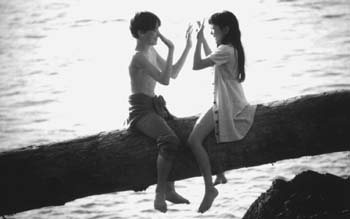![[Metroactive Movies]](/movies/gifs/movies468.gif)
[ Movies Index | Show Times | San Jose | Metroactive Central | Archives ]
Light in The Forest
'Snow Falling on Cedars' offers visual poetry
By Nicole McEwan
FIRST LOVES LAST. Forever. So goes the tag line of Snow Falling on Cedars, Scott Hicks' ravishingly beautiful adaptation of David Guterson's novel, a poetic meditation on the nature of romantic love set against a backdrop of post WWII racial intolerance in a small Pacific Northwest town. From its mesmerizing opening shot and on through a labyrinthine tunnel of expertly executed flashbacks, it becomes clear that Hicks has no intention of delivering the straight story. Instead, he honors the novel's sensuously ocular narrative style by using light, color and imagery to tell a story of passion, betrayal and redemption.
On the surface, the film might be described as Romeo and Juliet Japanese-American style. The story takes place in an isolated village near Puget Sound where white locals live in relative harmony with the Japanese immigrants. Much lip service is paid to equality and acceptance, including an annual festival in which a young Japanese beauty is crowned Strawberry Queen. Still, the foreign-born Japanese can own no land--and a shot of the interior of the school bus gives away the real story. White children gravitate to one side, the Japanese to the other.
When Ishmael (Ethan Hawke), the only son of a liberal newspaperman (Sam Shepard), falls in love with Hatsue (Youki Kudoh), the eldest daughter of a traditional farmer, the two children must steal way to the forest to conceal their romance. Their fairy-tale union comes to a crashing halt with the bombing of Pearl Harbor. Suddenly, all Japanese are viewed with suspicion. The irony that their German-American counterparts are not similarly ostracized and perceived as "secret Nazis" is inescapable. Before long, the beloved Hatsue and her family are carted off to an internment camp while Ishmael goes off to war. The lovers are reunited 10 years later. Hatsue's Japanese-American husband is on trial for murder. Is he a killer or a victim of lingering anti-Japanese sentiment? Ishmael, now a reporter, is torn between his grief over losing Hatsue, his desire for revenge and the knowledge that he possesses evidence that may exculpate his rival.
There are some taut courtroom scenes, which bring to mind To Kill a Mockingbird, but really Cedars owes a greater debt to Casablanca in its examination of love, honor and sacrifice, and the way fate throws people together only to pull them apart. Instead of intrusive voice-overs or less-than-subtle expository dialogue, Hicks fashions the film like an expressionistic puzzle, layering on image after image: two carefree children bounding breathlessly on a beach; a somber Ishmael peering down through a balustrade at the very lovely, very untouchable Hatsue below.
The result is a film absorbed through osmosis--from the virtual sensations it inspires. And despite being a literary adaptation, words seem nearly superfluous. One gets the idea that what dialogue remains could fit on a few sheets of paper. It's a challenging, interactive experience. A winning marriage of fine acting, superb cinematography and a dynamic narrative style, Snow Falling on Cedars is a potent reminder that they don't usually make them like this anymore.
[ San Jose | Metroactive Central | Archives ]
![]()

Snow Use Crying: Reeve Chaney and Ann Suzuki play young lovers in 'Snow Falling on Cedars.'
Snow Falling on Cedars (PG-13; 126 min.), directed by Scott Hicks, written by Hicks and Ronald Bass, based on the book by David Guterson, photographed by Robert Richardson and starring Ethan Hawke and Youki Kudoh, plays at selected theaters valleywide.
From the January 13-19, 2000 issue of Metro, Silicon Valley's Weekly Newspaper.